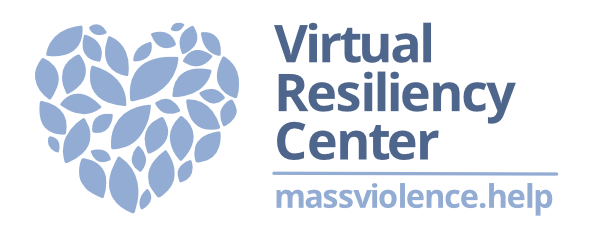Contact Us
To provide feedback on the Community Policing Dispatch, e-mail the editorial board at CPDispatch@usdoj.gov.
To obtain details on COPS Office programs, publications, and resources, contact the COPS Office Response Center at 800-421-6770 or AskCopsRC@usdoj.gov

U.S. Department of Justice
Office of Community Oriented Policing Services
Washington, DC 20530
The National Mass Violence Center (NMVC), based at the Medical University of South Carolina (MUSC) and funded by the U.S. Department of Justice Office for Victims of Crime (OVC), has launched the Virtual Resiliency Center (VRC) at MassViolence.help. The VRC is a first-of-its-kind website that centralizes evidence-based resources to help victims, survivors, and communities affected by mass violence. It also offers customizable pages online for communities to disseminate credible information after a mass violence incident (MVI).
 When an MVI occurs, local officials are almost always the trusted sources of information, which is frequently shared by news media. Some communities are challenged to quickly establish or update websites to provide information about victim services. When the incident is over, communities must work through the aftermath and begin the recovery process. Many localities establish in-person resiliency centers to serve as the focal point for providing victim services and critical resources, and for gaining access to personal and mental health support services. These centers take the lead in community response efforts, support, communication, commemoration, and healing.
When an MVI occurs, local officials are almost always the trusted sources of information, which is frequently shared by news media. Some communities are challenged to quickly establish or update websites to provide information about victim services. When the incident is over, communities must work through the aftermath and begin the recovery process. Many localities establish in-person resiliency centers to serve as the focal point for providing victim services and critical resources, and for gaining access to personal and mental health support services. These centers take the lead in community response efforts, support, communication, commemoration, and healing.
Resiliency Centers are very effective, but they take coordination and funding to establish—and they take time. That’s where the VRC at MassViolence.help fits in to meet critical needs between the occurrence of an MVI and the establishment of a brick-and-mortar resiliency center. The new site is accessible for free and is online 24 hours a day, seven days a week.
The VRC at MassViolence.help features four main sections:
- Victim & Social Services
- Social Connection & Empowerment
- Health & Wellness
- Managing Grief & Trauma
To learn more about resiliency centers and other trauma and support services following a mass violence incident, please visit the COPS Office’s Uvalde web page dedicated to the Critical Incident Review: Active Shooter at Robb Elementary School report and related resources.
Each standard section is pre-populated and includes easy-to-understand, credible information; videos of survivors and expert service providers sharing their insights; and links to other reliable sources of information for further exploration. The VRC addresses topics such as victims’ rights, social support and relationships after mass violence, stress management, grief, trauma symptoms, and managing substance use after an MVI.
Importantly, the NMVC team can quickly coordinate with officials after an MVI to create a community-specific resource page associated with the VRC at the MassViolence.help website. This technical assistance will allow communities to customize the site to suit local needs and be under the control of the locality. This information can guide affected victims and survivors to existing VRC resources and share community-specific information relevant to their mass violence crime, such as the location of a Family Assistance Center, vigils for victims, contacts for local services, and other pertinent material. This free tool offers communities the framework for sharing credible information and consistent messaging.
Contact the NMVC at nmvc@musc.org with any questions or for assistance with establishing a community page after an MVI.
Images courtesy of the Virtual Resiliency Center.
Subscribe to Email Updates
To sign up for monthly updates or to access your subscriber preferences, please enter your email address in the Subscribe box.






